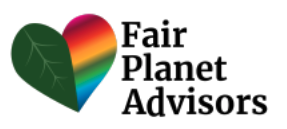Finance Column: ESG Performance, ESG Demand, and “Greenwashing”
By Michelina & David Roth
With record-breaking extreme weather events occurring across the globe, climate issues are getting more attention and Environmental Social Governance (ESG) investing is no exception. Investors at one time may have believed that investing in one’s values could mean diminished returns, but that is no longer the case. There is increasing evidence to show that taking Environmental, Social, and Governance issues into account may lead to better returns and although the demand for ESG is skyrocketing, the continued prevalence of “green-washing” and lack of ESG industry standards makes it difficult to measure.
The MSCI KLD 400 Social Index has kept pace and in many instances outperformed and was more resilient than the S&P 500 TR Index - the lows were less extreme than the S&P 500 TR Index
With this in mind, consider the recent work by Activist Investor Firm, Engine 1 which acquired three board seats in June (out of 12) on Exxon Mobile’s Board.
In order to do this, they needed to convince State Street, Vanguard, and Blackrock that moving away from fossil fuels would be good for the company’s investment risk.
Blackrock’s Vote Bulletin explains the decision, saying that, “we believe more needs to be done in Exxon’s long-term strategy and short-term actions in relation to the energy transition in order to mitigate the impact of climate risk on long-term shareholder value.” Clearly, all three companies concur with Engine 1’s premise that climate risk is investment risk. Engine 1’s website explains their position:
If these three giants (State Street, Vanguard, Blackrock) in mainstream investing are acting as if climate risk is investment risk, then clearly this sentiment is gaining traction. And this does seem to affect the attitude of many investors, as demand for ESG is skyrocketing. In July the Global Sustainable Investment Alliance (GSIA) released their 2020 Global Sustainable Investment Review which states that “at the start of 2020, global sustainable investment assets under management (AUM) reached US$ 35.3 trillion, a 15 percent increase since the 2018 report (based on assets reported by the United States, EU, Australia/New Zealand, Canada and Japan). Global sustainable investment AUM are 35.9 percent of total assets under management, up from 33.4 percent in 2018.
In the face of this rising demand for ESG, it has become clear that clear standards are needed for ESG funds. The lack of standards regarding what makes a fund “ESG” make it almost impossible to measure whether or not taking environmental, social, and governance issues into account helps mitigate risk in a fund.
As You Sow, a non-profit investor advocacy group has a grade (A-F) rating system - according to that system, 35 out of 88 funds with “ESG” in their name earn a D or F on climate change or deforestation and 43 out of 88 earned a D or F on another ESG issue. As You Sow provides free access to their investor score system which allows the common investor to know how a fund rates on many ESG issues from their climate risk issues to racial justice issues to exposure to the prison industrial complex.
In spite of expressing willingness to consider climate mitigation, many companies continue to “greenwash”. A good example of this is a new fund titled, “Carbon Transition Readiness ETF” which includes several fossil fuel companies. The fund drew $1.25 billion in investment dollars on the day that it launched but as Andrew Behar, CEO of As You Sow said, “The people who invested in that fund thought they were addressing climate risk, instead they got business as usual.” Unfortunately, that is all too common.
The Securities and Exchange Commission acknowledges the need to set standards for ESG funds in order to adequately mitigate the risk in those funds. Companies and organizations continue to provide comment on the need for proper disclosures.
Michelina A. Roth & David M. Roth, BFATM Financial Planner O:509.398.8428 | C: 541-705-7918 www.FairPlanetAdvisors.com
Check the background of this firm on FINRA's BrokerCheck: www.Brokercheck.finra.org/ This site is published for residents of the United States and is for informational purposes only and does not constitute an offer to sell or a solicitation of an offer to buy any security or product that may be referenced herein. Persons mentioned on this website may only offer services and transact business and/or respond to inquiries in states or jurisdictions in which they have been properly registered or are exempt from registration. Not all products and services referenced on this site are available in every state, jurisdiction or from every person listed.











